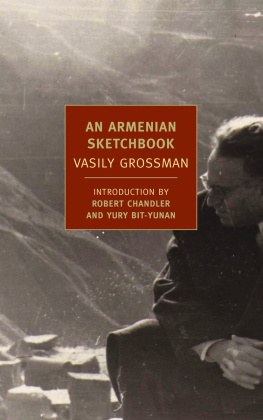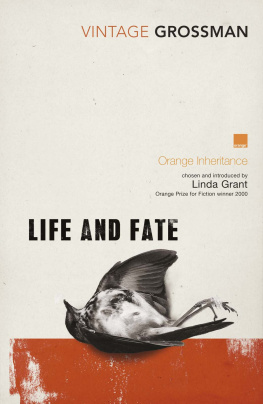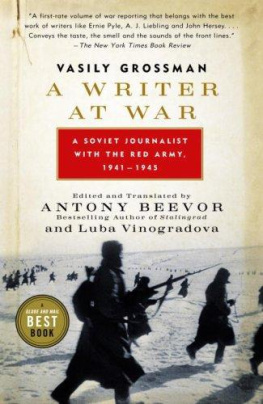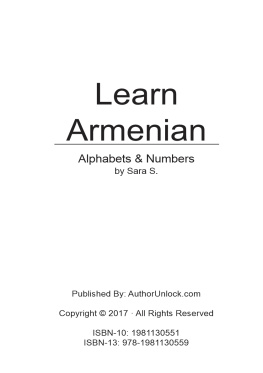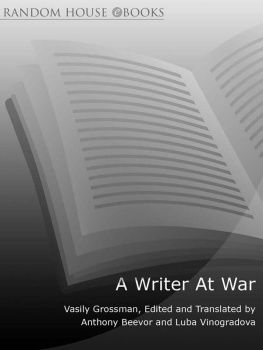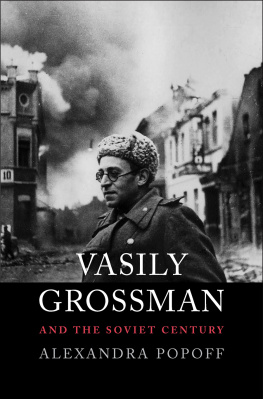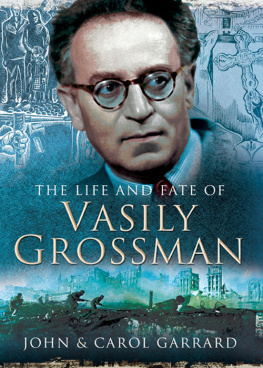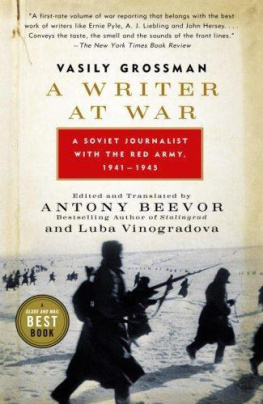
VASILY SEMYONOVICH GROSSMAN was born on December 12, 1905, in Berdichev, a Ukrainian town that was home to one of Europes largest Jewish communities. In 1934 he published both In the Town of Berdicheva short story that won the admiration of such diverse writers as Maksim Gorky, Mikhail Bulgakov, and Isaak Babeland a novel, Glyukauf, about the life of the Donbass miners. During the Second World War, Grossman worked as a reporter for the army newspaper Red Star, covering nearly all of the most important battles from the defense of Moscow to the fall of Berlin. His vivid yet sober The Hell of Treblinka (late 1944), one of the first articles in any language about a Nazi death camp, was translated and used as testimony in the Nuremberg trials. His novel For a Just Cause (originally titled Stalingrad) was published to great acclaim in 1952 and then fiercely attacked. A new wave of purgesdirected against the Jewswas about to begin; but for Stalins death, in March 1953, Grossman would almost certainly have been arrested himself. During the next few years Grossman, while enjoying public success, worked on his two masterpieces, neither of which was to be published in Russia until the late 1980s: Life and Fate and Everything Flows. The KGB confiscated the manuscript of Life and Fate in February 1961. Grossman was able, however, to continue working on Everything Flows, a novel even more critical of Soviet society than Life and Fate, until his last days in the hospital. He died on September 14, 1964, on the eve of the twenty-third anniversary of the massacre of the Jews of Berdichev in which his mother had died.
ROBERT CHANDLER is the author of Alexander Pushkin and the editor of two anthologies for Penguin Classics: Russian Short Stories from Pushkin to Buida and Russian Magic Tales from Pushkin to Platonov. His translations of Sappho and Guillaume Apollinaire are published in the Everymans Poetry series. His translations from Russian include Vasily Grossmans Life and Fate, Everything Flows, and The Road (all published by NYRB Classics); Leskovs Lady Macbeth of Mtsensk; and Aleksander Pushkins The Captains Daughter. Together with Olga Meerson and his wife, Elizabeth, he has translated a number of works by Andrey Platonov. One of these, Soul, won the 2004 AATSEEL (American Association of Teachers of Slavonic and East European Languages) Prize. His translation of Hamid Ismailovs The Railway won the AATSEEL Prize for 2007 and received a special commendation from the judges of the 2007 Rossica Translation Prize.
ELIZABETH CHANDLER is a co-translator, with her husband, of Pushkins The Captains Daughter; of Vasily Grossmans Everything Flows and The Road; and of several volumes of Andrey Platonov: The Return, The Portable Platonov, Happy Moscow, and Soul.
YURY BIT-YUNAN was born in Bryansk, in western Russia. He graduated from the Russian State University for the Humanities in Moscow, and completed his doctorate on the work of Vasily Grossman. At present he is lecturing on literary criticism at the the Russian State University for the Humanities while continuing to research Grossmans life and work.
AN ARMENIAN SKETCHBOOK
VASILY GROSSMAN
Translated from the Russian by
ROBERT and ELIZABETH CHANDLER
With an introduction and notes by
ROBERT CHANDLER and YURY BIT-YUNAN
NEW YORK REVIEW BOOKS

New York
THIS IS A NEW YORK REVIEW BOOK
PUBLISHED BY THE NEW YORK REVIEW OF BOOKS
435 Hudson Street, New York, NY 10014
www.nyrb.com
Copyright by E.V. Korotkova-Grossman and F.B. Guber
Translation and notes copyright 2013 by Robert Chandler
All rights reserved.
An Armenian Sketchbook is translated from the text of Dobro vam published in Vasily Grossman, Sobranie sochinenii v 4-h tomakh (Moscow: Agraf, 1998).
Cover image: Vasily Grossman in Armenia, with ruins of the Hellenistic temple of Garni in the background
Cover design: Katy Homans
The Library of Congress has cataloged the earlier printing as follows:
Grossman, Vasilii, 19051964.
[Dobro vam. English]
An Armenian sketchbook / by Vasily Grossman ; translated by Robert and
Elizabeth Chandler ; with an introduction and notes by Robert Chandler and
Yury Bit-Yunan.
pages ; cm. (New York Review Books classics)
ISBN 978-1-59017-618-4 (alkaline paper)
1. Grossman, Vasilii SemenovichTravelArmenia (Republic) 2. Armenia (Republic)Description and travel. I. Chandler, Robert, 1953, translator, writer of added commentary. II. Chandler, Elizabeth, 1947, translator. III. Bit-Yunan, Yury, writer of added commentary. IV. Title. V. Series: New York Review Books classics.
PG3476.G7D613 2013
891.73'42dc23
2012039197
eISBN 978-1-59017-635-1
v1.0
For a complete list of books in the NYRB Classics series, visit www.nyrb.com or write to:
Catalog Requests, NYRB, 435 Hudson Street, New York, NY 10014
CONTENTS
Introduction
AN ARMENIAN SKETCHBOOK, written in early 1962, two years before Vasily Grossmans death in September 1964, is unlike anything else Grossman wrote. It is deeply personal and has an air of spontaneity; Grossman seems simply to be chatting to the reader about his immediate impressions of Armeniaits people, its mountains, its ancient churchesand digressing, almost at random, onto subjects that range from the problem of nationalism to his views on art and even his difficulties with his bladder and bowels.
The underlying cause of these physical problems was that Grossman was in the early stages of cancer, soon to be diagnosed in one of his kidneys. Just as Everything Flows, which he began in the mid-1950s but continued to expand and revise during his last years, is Grossmans political testament, so An Armenian Sketchbook is his personal testament, a discussion of the values he holds dearestin art and in life. It seems likely that, at some level, Grossman sensed he did not have long to live.
There are relatively few memoirs of Grossman, and there is no other work, by Grossman or anyone else, that gives us so clear a sense of the man he was. Three qualities stand out: an unusual openness to other people, and especially to those who are not members of the Soviet elite; a clearheaded skepticism, directed sometimes towards others but more often towards himself; and a quiet, modest persistence. Grossman never deliberately sets out to be original, either with regard to literary style or with regard to content; his originality emerges only gradually, as he doggedly continues to see with his own eyes and to think his own thoughts. And the remarkable coherence of these thoughts emerges equally gradually; the different threads of this apparently casual memoir are deftly interwoven.
Russian writers, unable to travel freely outside the Russian (or Soviet) Empire, have often been attracted to the Caucasus, and they have left us a number of fine travel sketches: Alexander Pushkins Journey to Erzurum and Osip Mandelstams Journey to Armenia are the two most remarkable.[] Grossman, however, does not mention either of these works; the inspiration for An Armenian Sketchbook came not from literature but from the circumstances of his life.
In October 1960, Grossman had submitted the manuscript of Life and Fate to the editors of a Soviet literary journal. It was the height of Khrushchevs thaw and Grossman seems genuinely to have believed that

